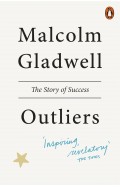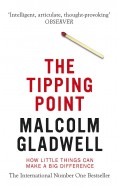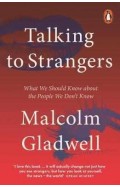- Home
- History
- Political
- Revenge of the Tipping Point - Overstories, Superspreaders and the Rise of Social Engineering
Revenge of the Tipping Point - Overstories, Superspreaders and the Rise of Social Engineering
By: Malcolm Gladwell
-
Rs 3,865.50
- Rs 4,295.00
- 10%
-

You save Rs 429.50.
Due to constant currency fluctuation, prices are subject to change with or without notice.
Twenty-five years after the publication of his groundbreaking first book, Malcolm Gladwell returns with a brand new volume that reframes the lessons of The Tipping Point in a startling and revealing light
Why in the late 1980s and early '90s did Los Angeles become the bank robbery capital of the world? What is the Magic Third and what does it have to do with racial equity? What do big cats and clusters of teen suicides have in common? These are just some of the questions Malcolm Gladwell addresses in this new work, which revisits the phenomenon of epidemics and examines the ways in which we have learned to tinker with and shape the spread of ideas, viruses, and trends-sometimes with great success, sometimes with disastrous consequences.
Gladwell shows that-whether in neighbourhoods, schools, zoos, or conference rooms-today's epidemics are no longer singular occurrences, but turbocharged versions of their earlier counterparts and we are more tempted than ever to try and manipulate tipping points for their own ends. Yet these efforts often come at a cost, creating difficult tradeoffs and unexpected dilemmas . Above all we must recognise our responsibility - as individuals and as a society - to take tipping points seriously if we want to change the world for the better . With this thought-provoking new book , his most personal yet, Gladwell gives us the insights we need to meet these challenges in innovative ways .
Twenty-five years after the publication of his groundbreaking first book, Malcolm Gladwell returns with a brand new volume that reframes the lessons of The Tipping Point in a startling and revealing light
Why in the late 1980s and early '90s did Los Angeles become the bank robbery capital of the world? What is the Magic Third and what does it have to do with racial equity? What do big cats and clusters of teen suicides have in common? These are just some of the questions Malcolm Gladwell addresses in this new work, which revisits the phenomenon of epidemics and examines the ways in which we have learned to tinker with and shape the spread of ideas, viruses, and trends-sometimes with great success, sometimes with disastrous consequences.
Gladwell shows that-whether in neighbourhoods, schools, zoos, or conference rooms-today's epidemics are no longer singular occurrences, but turbocharged versions of their earlier counterparts and we are more tempted than ever to try and manipulate tipping points for their own ends. Yet these efforts often come at a cost, creating difficult tradeoffs and unexpected dilemmas . Above all we must recognise our responsibility - as individuals and as a society - to take tipping points seriously if we want to change the world for the better . With this thought-provoking new book , his most personal yet, Gladwell gives us the insights we need to meet these challenges in innovative ways .
The Tipping Point: How Little Things Can Make a Big Difference
By: Malcolm Gladwell
Rs 2,245.50 Rs 2,495.00 Ex Tax :Rs 2,245.50
Blink: The Power of Thinking Without Thinking
By: Malcolm Gladwell
Rs 1,615.50 Rs 1,795.00 Ex Tax :Rs 1,615.50
Talking to Strangers : What We Should Know about the People We Don't Know
By: Malcolm Gladwell
Rs 2,245.50 Rs 2,495.00 Ex Tax :Rs 2,245.50
What the Dog Saw: And Other Adventures - Paperback
By: Malcolm Gladwell
Rs 1,525.75 Rs 1,795.00 Ex Tax :Rs 1,525.75
What the Dog Saw - And Other Adventures
By: Malcolm Gladwell
Rs 2,335.50 Rs 2,595.00 Ex Tax :Rs 2,335.50
The Bomber Mafia - A Story Set in War
By: Malcolm Gladwell
Rs 2,797.50 Rs 5,595.00 Ex Tax :Rs 2,797.50
Talking to Strangers - What We Should Know about the People We Don't Know
By: Malcolm Gladwell
Rs 1,440.75 Rs 1,695.00 Ex Tax :Rs 1,440.75
David and Goliath - Underdogs, Misfits and the Art of Battling Giants
By: Malcolm Gladwell
Rs 2,515.50 Rs 2,795.00 Ex Tax :Rs 2,515.50
Zubin Mehta: A Musical Journey (An Authorized Biography)
By: VOID - Bakhtiar K. Dadabhoy
Rs 892.50 Rs 1,050.00 Ex Tax :Rs 892.50
A Book of Secrets: Finding comfort in a complex world THE INSTANT SUNDAY TIMES BESTSELLER
By: Derren Brown
Rs 2,035.75 Rs 2,395.00 Ex Tax :Rs 2,035.75
Improvise!: Use the Secrets of Improv to Achieve Extraordinary Results at Work
By: Max Dickins
Rs 2,120.75 Rs 2,495.00 Ex Tax :Rs 2,120.75
Good Company: How to Build a Business without Losing Your Values
By: Julietta Dexter
Rs 1,610.75 Rs 1,895.00 Ex Tax :Rs 1,610.75
Creating Breakthrough Products: Innovation from Product Planning to Program Approval
By: N/A
Rs 760.75 Rs 895.00 Ex Tax :Rs 760.75
The Hidden Door - Understanding and Controlling Dreams
By: Peter Fenwick
Rs 952.00 Rs 2,380.00 Ex Tax :Rs 952.00
The Origins of Political Order From Prehuman Times to the French RevolutioN
By: Francis Fukuyama
Rs 4,045.50 Rs 4,495.00 Ex Tax :Rs 4,045.50
Manning Up: How the Rise of Women Has Turned Men into Boys
By: Kay Hymowitz
Rs 845.75 Rs 995.00 Ex Tax :Rs 845.75
The Obama Syndrome: Surrender At Home War Abroad
By: Tariq Ali
Rs 1,100.75 Rs 1,295.00 Ex Tax :Rs 1,100.75
The Quest For Meaning: Developing A Philosophy Of Pluralism
By: Tariq Ramadan
Rs 1,185.75 Rs 1,395.00 Ex Tax :Rs 1,185.75
A Book of Secrets: Finding comfort in a complex world THE INSTANT SUNDAY TIMES BESTSELLER
By: Derren Brown
Rs 2,035.75 Rs 2,395.00 Ex Tax :Rs 2,035.75
Improvise!: Use the Secrets of Improv to Achieve Extraordinary Results at Work
By: Max Dickins
Rs 2,120.75 Rs 2,495.00 Ex Tax :Rs 2,120.75
Good Company: How to Build a Business without Losing Your Values
By: Julietta Dexter
Rs 1,610.75 Rs 1,895.00 Ex Tax :Rs 1,610.75
Creating Breakthrough Products: Innovation from Product Planning to Program Approval
By: N/A
Rs 760.75 Rs 895.00 Ex Tax :Rs 760.75
The Hidden Door - Understanding and Controlling Dreams
By: Peter Fenwick
Rs 952.00 Rs 2,380.00 Ex Tax :Rs 952.00
Sherlock Holmes: The Stockbroker's Clerk (Easy Classics): 19
By: Arthur Conan Doyle
Rs 1,347.50 Rs 2,695.00 Ex Tax :Rs 1,347.50
City of Dragons: Volume Three of the Rain Wilds Chronicles
By: Robin Hobb
Rs 675.75 Rs 795.00 Ex Tax :Rs 675.75
Tabarkat e Nabvi Ki Tareekhi Dastavez
By: Yousaf Bin Abdul Haadi Muqadsi
Rs 408.00 Rs 480.00 Ex Tax :Rs 408.00
Zubin Mehta: A Musical Journey (An Authorized Biography)
By: VOID - Bakhtiar K. Dadabhoy
Rs 892.50 Rs 1,050.00 Ex Tax :Rs 892.50
The Tipping Point: How Little Things Can Make a Big Difference
By: Malcolm Gladwell
Rs 2,245.50 Rs 2,495.00 Ex Tax :Rs 2,245.50
Blink: The Power of Thinking Without Thinking
By: Malcolm Gladwell
Rs 1,615.50 Rs 1,795.00 Ex Tax :Rs 1,615.50
Talking to Strangers : What We Should Know about the People We Don't Know
By: Malcolm Gladwell
Rs 2,245.50 Rs 2,495.00 Ex Tax :Rs 2,245.50
What the Dog Saw: And Other Adventures - Paperback
By: Malcolm Gladwell
Rs 1,525.75 Rs 1,795.00 Ex Tax :Rs 1,525.75
What the Dog Saw - And Other Adventures
By: Malcolm Gladwell
Rs 2,335.50 Rs 2,595.00 Ex Tax :Rs 2,335.50
The Bomber Mafia - A Story Set in War
By: Malcolm Gladwell
Rs 2,797.50 Rs 5,595.00 Ex Tax :Rs 2,797.50
Talking to Strangers - What We Should Know about the People We Don't Know
By: Malcolm Gladwell
Rs 1,440.75 Rs 1,695.00 Ex Tax :Rs 1,440.75
David and Goliath - Underdogs, Misfits and the Art of Battling Giants
By: Malcolm Gladwell
Rs 2,515.50 Rs 2,795.00 Ex Tax :Rs 2,515.50
A Book of Secrets: Finding comfort in a complex world THE INSTANT SUNDAY TIMES BESTSELLER
By: Derren Brown
Rs 2,035.75 Rs 2,395.00 Ex Tax :Rs 2,035.75
Improvise!: Use the Secrets of Improv to Achieve Extraordinary Results at Work
By: Max Dickins
Rs 2,120.75 Rs 2,495.00 Ex Tax :Rs 2,120.75
Good Company: How to Build a Business without Losing Your Values
By: Julietta Dexter
Rs 1,610.75 Rs 1,895.00 Ex Tax :Rs 1,610.75
Creating Breakthrough Products: Innovation from Product Planning to Program Approval
By: N/A
Rs 760.75 Rs 895.00 Ex Tax :Rs 760.75
The Hidden Door - Understanding and Controlling Dreams
By: Peter Fenwick
Rs 952.00 Rs 2,380.00 Ex Tax :Rs 952.00






















-120x187.jpg?q6)











-120x187.jpg?q6)
















